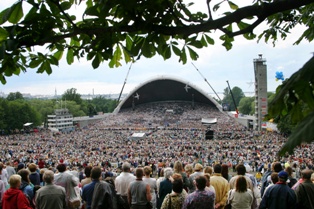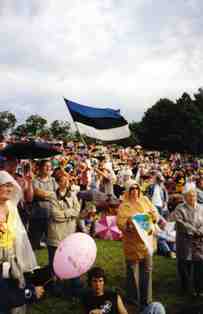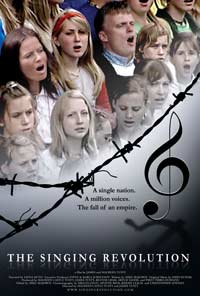Winning Freedom Through Song: Estonia's "Singing Revolution"
Mary Ellyn Hutton
Posted: Jun 19, 2008 - 12:34:37 AM in
news_2008
What do you do if your neighbor covets your
property and outnumbers you 100 to one?
You might try
singing.
Estonia did -- and won its freedom from the
Soviet Union in 1991.
Tiny
Estonia, a nation of one-and-a-half-million people,
whose prime location on the Baltic Sea just across from
Finland has spelled
domination by foreign powers for 700 years, did it without firing a shot.
Their remarkable
story is told in a new film, “The Singing Revolution,” to be presented by
Cincinnati World Cinema at 7 p.m. June 24-26 at the
Cincinnati
Art Museum in
Eden
Park.
The 97-minute
documentary, four years in the making by James and Maureen Castle Tusty of
Mountain View Productions Ltd. (
New York, Atlanta)
was released in the
United
States in December, 2007. It been held over for weeks in many cities,
including
Boston,
Dallas,
Houston,
Denver,
San Francisco and
New
York.
It is a dramatic,
David-and-Goliath story, told in historic footage and compelling narrative.
In a nutshell: Having forged their own identity during the
“national
awakening” that took place in the mid to late-19th century,
Estonia won its independence from Czarist Russia during the Russian Revolution. Independence was declared in 1919 and Russia signed the Treaty of Tartu in 1920, relinquishing any claim to Estonia "forever." The
Republic of
Estonia
was formed.
The Soviet Union
re-occupied
Estonia
during World War II and forcibly annexed it (in violation of the Treaty of Tartu).
With no help from the war-weary Allies, Estonians kept their hopes alive
during the terror and mass deportations of the next half-century by clinging to
their language and culture.

Song Festival Grounds, Tallinn, Estonia
|
Central to
this was the National Song Festival (Laulupidu, founded in 1869) that brought
choirs from all over
Estonia
to the capital city of
Tallinn
every five years.
Even as they were
forced to sing praises to Stalin, festival participants mixed in Estonian songs,
ending with what became an unofficial, clandestine national anthem, “My Country is My Love” by
legendary conductor Gustav Ernesaks with verses by revered Estonian poet Lydia
Koidula.
When Soviet Prime
Minister Mikhail Gorbachev instituted perestroika (re-structuring) and glasnost
(free speech) in the 1980s in an attempt to save the failing Soviet system, Estonians
saw their opportunity to break free.

Crowd with Estonian flag at 2004 Estonian National Song Festival (Laulupidu)
|
Step by step, they re-asserted
their liberty, flying the Estonian flag, forming a 200-mile-long human chain
with their Baltic neighbors (
Latvia
and
Lithuania)
and finally declaring re-independence openly.
When Soviet tanks rolled into
Tallinn,
people took to the streets (singing, of course) and the army withdrew.
Learn more about the film at its web site www.singingrevolution.com.
Tickets for the Cincinnati Art Museum showing are $7 at 513-721-ARTS, toll-free at 1-877-548-3237, at the
Cincinnati
Art Museum and online at www.cincyworldcinema.org. Get them for $9 at Sitwell’s Coffeehouse in
Clifton, Lookout Joe in
Mount Lookout Square,
Coffee Emporium on
Central Parkway
downtown, Shake It Music and Video in Northside and at the door, depending on
availability.


